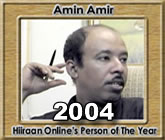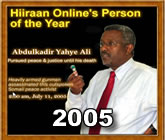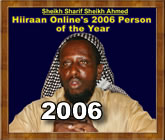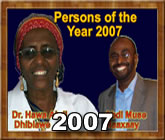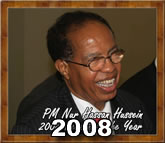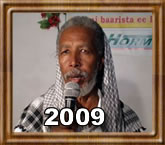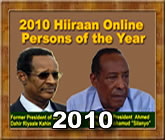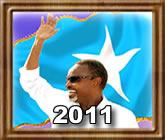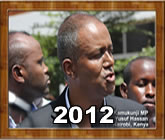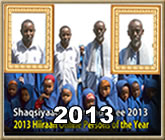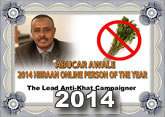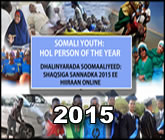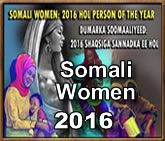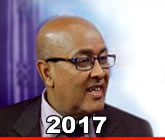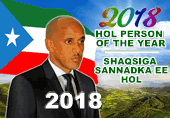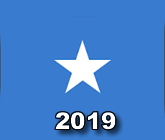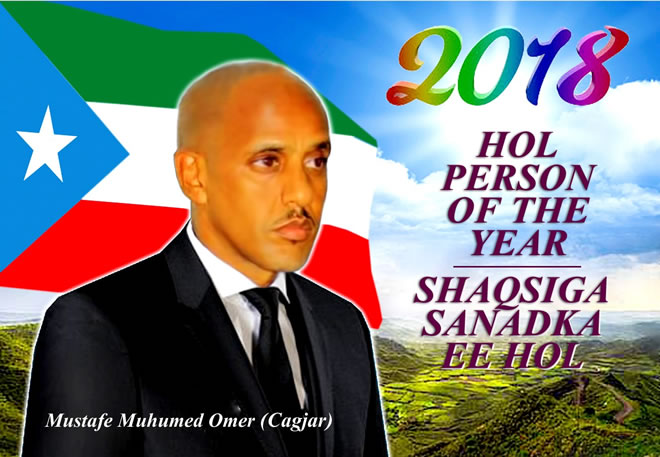
Hiiraan Online Editorial
Saturday, January 05, 2019
Arguably, the single most important test for the Somali intellectual of our times is unveiling the truth in today’s noisy and perplexing Somali world order. This world order is characterized by deception, misinformation, and viciousness all hyped up through the social media, a technological innovation that is available both to the region’s oppressive states, terrorists, and powerful groups, and to the philanthropists, activists, critics, and intellectuals. In an era, where actors in the Somali peninsula, from the Liyu police to AMISOM, from Al-shabab to the Somali state, from powerful and dominant Horn of Africa countries to the American special forces and Chinese companies, are claiming that their interventions advance the interest of the Somali national, the task of separating the wheat from chaff and laying bare the truth becomes very daunting and even dangerous for today's Somali intellectual. HOL recognizes Mustafe Muhumed Omer (a.k.a Mustafe Cagjar) as the 2018 person of the year for his courage to defend the truth which has been concealed and replaced with false accounts by the Horn of Africa's most powerful actors and their mighty allies in the East and West.
In such a difficult context and during these trying times, three types of intellectuals have emerged, making Mustafe, an average man by Somali 'physical' standards, a towering figure among the intellectuals. In the first category are those Somali intellectuals who, contrary to duty and reason, provide the intellectual ammunition for oppressive and unjust forces. These are easily swayed by what Durkheim referred to as ‘the enthusiasms of the crowd and the prestige of authority’. Unjust forces appeal to these intellectuals’ enchantment and admirations of modern life and get their buy-in by fulfilling their narrow private interests. In the second category are Somali intellectuals who devote their time and energy to advance their career and well-being of their families. Many of these are stars in their professional fields and work at local and global institutions. These intellectuals are not self-interested crooks indifferent to the welfare of others because, through their jobs, they contribute to humanity. Nonetheless, modern life’s distractions, challenges, and temptations seem to have compelled them to become relatively disengaged and to leave the difficult task of the ‘representation of the intellectual’ to others. Then there are those Edward Said calls them the real intellectuals who side with the weak, denounce exploitation, and ‘defy imperfect or oppressive authority’. Mustafe tops this group of ‘organic’ intellectuals who, in Noam Chomsky’s power lexicon, “speak truth to power” and unveil the truth about the human condition.
Mustafe has consistently, particularly over the last two years, denounced injustice and oppression and defended the weak and the marginalized in the Somali region and the wider Horn of Africa. His intellectual representation, in Edward Said’s sense, involved ‘both commitment and risk, boldness and vulnerability”. It involved commitment because Mustafe, despite being a busy UN bureaucrat, incessantly wrote about the plight of the people in the region. He took bold positions and refused to be co-opted by the then mighty TPLF-dominated Ethiopian government. There were vulnerabilities this mighty government attempted to exploit to silence Mustafe : it expropriated his house, vehicles, and land; it denied jobs to his siblings and relatives; it jailed and tortured his younger brother and father, eventually killing his brother, Feysal Cagjar. As a true intellectual Mustafe did not bend to the twisted logic of the oppressive authority. In a piece he posted on Sahan Journal, Death Foretold: the killing of my brother, Mustafe wrote “Faysal’s life was in my hands – or more accurately on my lips. Ten days before the murder of my brother, President [of Somali region] Abdi Mohamud Omer, through his aides, gave me an ultimatum… or else my families inside Ethiopia will pay a heavy price for my defiance…I refused to oblige the ultimatum”. Although many might question the rationale for not accepting the government’s ultimatum to save his brother’s life, the sacred duty of the critical intellectual is to avert attention and interest from the self to seek justice for all. Fulfilling this sacred duty is often assorted with pain, a pain that any intellectual or leader of significance for the world including prophets went through and were ridiculed for by the same society they were sacrificing for.
HOL also recognizes Mustafe for challenging the Somali intellectuals to take up their responsibility in these difficult times. Mustafe articulated the need to speak up even when it is forbidden to say the emperor has no clothes with compelling prose, writing in Somali: “dulmi hadaad diidan tahay maalinkaad aragtid inuu liitana baalaxoofto lalama soo baxo; maalinkaad dareentid in wali xidido u aasan yihiina sida rah jiilaal jooga la isma aaso.” In another post, Mustafe challenged Somali Islamic clerics to avoid selective justice of condemning rape perpetrators when they are weak, urging them to equally condemn when perpetrators are powerful individuals or oppressive states. Mustafe, through a stream of diligent and penetrating online pieces, deplored the deafening silence of the Somali intellectuals in the face of oppression in the Somali region. One of his posts read:
You compare the detachment of Somali region intellectuals from the political struggle of their people to the spirited engagement of their Oromo counterparts and you get the reasons for the huge disparity in the political consciousness of the two people. Somali region intellectuals not only shirked their responsibility for the progress and liberation of their people, they actually discourage the few who try to mobilize the people for these causes.
Mustafa’s cry for intellectuals to heed to the call of consciousness and challenge oppressive and unjust state is akin to the sixteen-century French political philosopher, Etienne de La Boitie’s call for action against a tyrannical French state that, according to La Boitie, only existed with the consent of the people, particularly the intellectuals. As Noam Chomsky put it: “Intellectuals are in a position to expose the lies of governments, to analyze actions according to their causes and motives and often hidden intentions”. When Mustafe stated: “we owe a good deal of our perpetual misery to the apathy of the intellectuals”, he was referring to the failure of the Somali intellectuals to deploy their capacity and to use their position to improve the human condition in the Somali region.
We believe it is the responsibility of the critical intellectual to defy the odds and behave in ways that usually seem peculiar to the casual observer. Through this peculiarity do intellectuals bring about progressive changes in society that might only get recognition later or never. Luckily, that recognition came early for Mustafe: the same Ethiopian state TV and many Somali owned media outlets that presented unconstrained government lies and propaganda in the past now present gross human rights violations the state committed against the people of the Somali region and neighboring regions in Somalia. The new Ethiopian Prime Minister called that state the “terrorist state”. When Mustafe depicted this state as a terrorist state and endlessly exposed its lies, he certainly came across peculiar for many in the Somali peninsula who accepted the government’s propaganda which pained a prosperous and stable Somali region.
We also recognize Mustafe for his eloquence in communicating his ideas, a quality that defines critical intellectuals. As a prolific writer in Somali, English, and Amharic, Mustafe has been able to reach out to a large audience across the Horn of Africa and in the diaspora to reveal the truth. Two insights can be drawn from Mustafe’s writings and intellectual engagement philosophy: exiled intellectuals can remain a credible voice for the marginalized at home through the media; and intellectuals can carve out space for discharging their responsibility while simultaneously delivering on the mandate that comes with their day jobs even when coupled with the responsibility of caring for a big family.
Mustafe, a family man who is blessed with seven children and has been in exile for 11 years, became the president of the Somali Regional State (SRS) in August, 2018. While HOL’s recognition has to do with Mustafe’s intellectual contribution before he became the leader of the SRS, there are signs that he continues to defy the obvious. In his own peculiar fashion, Mustafe, for the first time in 30 years, challenged the commonly accepted credo that ‘Somalinimo’ and being Ethiopian are mutually exclusive. He posted on his Facebook page “there is no contradiction between our Somali NATIONALITY and Ethiopian CITIZENSHIP”, a statement that is true to Mustafe, who, in Edward Said’s’ sense, continues to raise controversial and embarrassing but very important questions. There is no better person to explain the edginess of looking for unorthodox answers to questions of the day than Mustafe himself:
I crave big places, big horizons, expansive frontiers. Big ideas, bigger identities too. That is why I resent when others confine me to particular philosophies, ideologies, politics, race, clans, and groups. I need big open space to think and to explore. I need the universe. I don't want to be restricted to my village, my home, my clan. I need a broader vista. A larger field. I need to be homeless. By thought.
In today’s world where people are digging in their heels to preserve narrow identities, interests, and ideas at the expense of humanity, and intellectuals are failing their responsibility to represent the society's weakest, the HOL editorial board recognizes Mustafe as the 2018 person of the year for answering the call of consciousness and siding with the weak and the forgotten and unveiling hidden truths and intentions in the face of oppression and confusion. Certainly, ‘Mustafe the intellectual’ has set the bar high and expectations are equally high for ‘Mustafe the President’ to deal with the past injustices, to govern with humility, to defend the weak, to side with the truth, and to put the Somali region on the path of recovery and reconciliation, sustained peace and prosperity. Indeed, there are high expectations that President Mustafe would demand and ensure Somalis have a seat at the decision-making table at the national level and are no longer marginalized in Ethiopia where they are the third largest ethnic group and have the second if not the largest region in terms of territory, a territory well endowed with natural resources.
HOL Persons of the Year (2004 - 2018)

